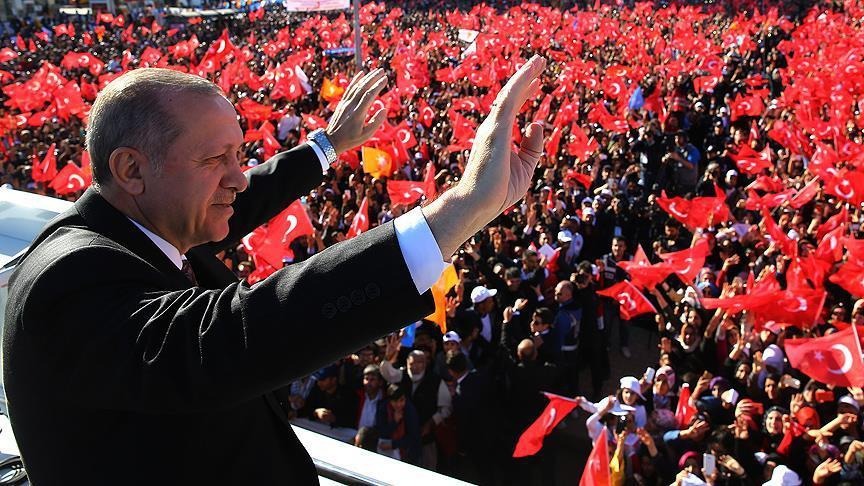In February, Turkish foreign ministry spokesman Hami Aksoy condemned China's treatment of its Muslim ethnic Uighur people as “a great cause of shame for humanity” and asked it to close the “concentration camps.” “It is no longer a secret that more than one million Uighur Turks, who are exposed to arbitrary arrests, are subjected to torture and political brainwashing in concentration centres and prisons,” Aksoy added.
China's Embassy in Ankara called Aksoy's comments “completely unacceptable” and demanded that he withdraw his “false accusations”.
“Both China and Turkey face the arduous task of fighting terrorism. We are opposed to maintaining double standards on the question of fighting terrorism,” A Chinese Embassy representative said in a statement.
It was the first open squabble between Ankara and Beijing after the 2015 incident, when Thailand, under pressure from China, decided to extradite nearly 100 Uighurs, some of whom held Turkish citizenship.
After fighting between Uighur Muslims and Han Chinese left more than 140 people dead and over 800 injured on streets of Xinjiang in 2009, and a series of terrorist attacks, the Chinese authorities has launched a series of crackdowns in the region, which is home to more than 10 million ethnic Uighurs.
Muslims complain of severe restrictions on religion and freedom of expression. Young men are banned from growing beards in Xinjiang and women are forbidden to wear their face veils.
Many mosques in the region were closed by the authorities, and China appears to be attempting to eradicate Muslim ethnic minorities and to forcefully assimilate them into the Han Chinese majority. The Chinese state is putting Muslims in “reeducation camps” – causing significant psychological damage to the innocent population in the process.
Chinese officials have denied that abuses have occurred; instead they characterize these camps as “vocational education and employment training centres” for “criminals involved in minor offences.”
Turkey is the first major Muslim country to have openly opposed the continued internment of Muslims, and in particular the Uighurs living in Xinjiang.
Whilst China’s treatment of Uighurs was raised earlier by Indonesia, Kazakhstan and Kyrgyzstan, (a substantial number of ethnic-Kazakhs and ethnic-Kyrgyz have also been sent to the camps), the Turkish government has entered the debate with greater eloquence. This “silent diplomacy” may appear to be productive: China has begun to release hundreds of ethnic Kazakhs from detention camps. Astana’s foreign ministry said that it had negotiated for the release of 2,000 Chinese Kazakhs from Xinjiang.
Why does Turkey, which recently has valued its relationship with China above Uighur rights, now support the Uighurs in Xinjiang?
Turkey’s zeal for closer relations with China has been increasing since Erdogan’s landmark visit to China. The Turkish government clearly seeks deep bilateral relations with Chinese companies.
In his New Year's message to Chinese President Xi Jinping, Erdogan said that he wants to host the Chinese leader in Turkey in 2019, in order to guarantee the continuation of the cooperation between the two countries.
Among other things, last year the Industrial and Commercial Bank of China has provided a $3.6 billion loan package for the Turkish energy and transportation sector.
According to the official version, Turkey sympathises with Xinjiang Muslims, especially Uighurs, 90% of whom have Turkic roots. However, as it seems, the reality may be somewhat different.
First of all, the statement of the Turkish Foreign Ministry has an unconditional domestic political meaning in connection with the upcoming March 31st municipal elections in Turkey.
The fact is that the ruling Justice and Development Party of Recep Erdogan may lose control over some major cities of Turkey. In addition, the party is criticised by other parties, including the nationalist “Good Party,” precisely because of the silence of the Turkish government against previous oppression of Muslim Uighurs in China.
The intensity of passions in the local elections this year and the degree of tension in society in many ways resembles the presidential race: however it is suggested that Erdogan’s loss of control of several large cities is unlikely to significantly affect the political landscape across the country as a whole.
Nevertheless, the loss of Ankara and Istanbul, along with the main tourist centres of the Aegean and Mediterranean coasts, where a third of the country's population lives and which are the main drivers of the economy, in the context of a tangible economic crisis, economic stability is threatened.
In addition, it has long been noted that Recep Erdogan is trying to create for himself the image of a “fighter for human rights” and a “defender of ethnic and religious minorities” in the eyes of the international community.
However, Turkey itself pursues the same repressive policy. A new wave of arrests have begun in the country. Recently, Ankara’s public prosecutor has ordered the detention of 1,112 people over suspected links to a failed coup attempt.
Warrants have been issued to those with suspected links to the network of the US-based Muslim cleric Fethullah Gulen, who is accused of orchestrating the attempted coup in 2016.
Tens of thousands of people have been taken into custody over suspected links to Gulen since 2016 while over 100,000 - including teachers, police officers, and judges - have been sacked or suspended from the public sector. More than 31,000 people have been convicted or jailed over suspected Gulen links.
Moreover, another topic that explains Ankara’s interest in the Uighur issue is Syria, especially considering the fact that Turkey currently faces an acute problem of maintaining its dominance in the north of the Arab country.
Thus, it seems that Ankara’s foreign policy attacks on Beijing are designed not only to divert attention from the many problems of internal development, but also to mobilize the nationalist electorate on the eve of local elections and exploit the plight of the Uighur people in order to achieve its own geopolitical goals in Syria.
By Masood Iqbal Mir

